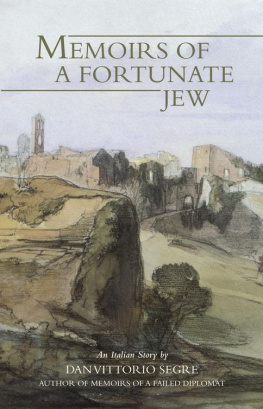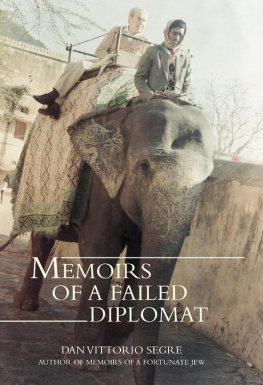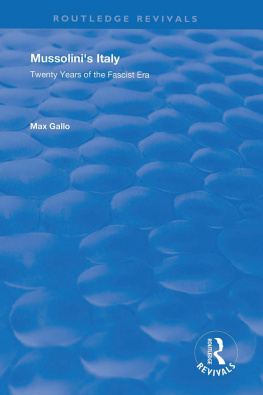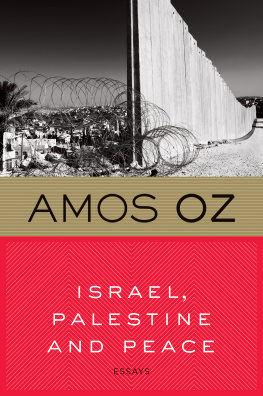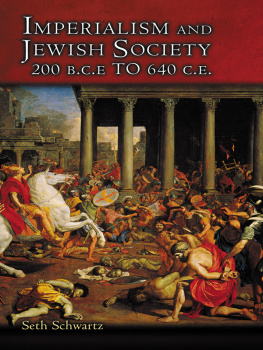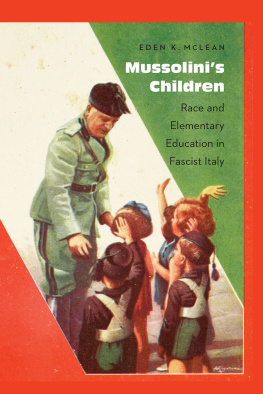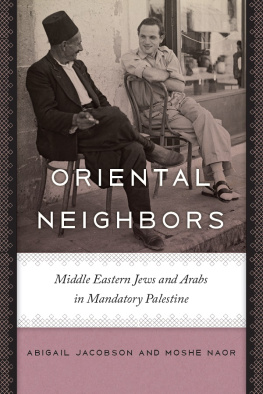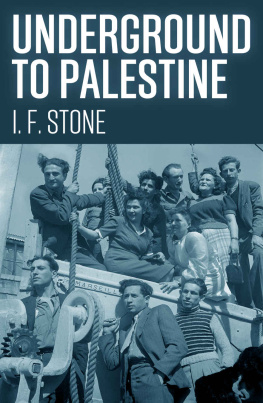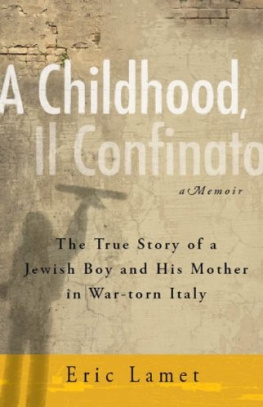A haunting tale, beautifully written and with a talent, reminiscent of Proust, to endow the past with a deep psychological meaning A stunning exercise in self-awareness.
Amos Elon
A fascinating description of childhood in Fascist Italy, a moving account of adolescence in Mandatory Palestine, an extraordinary book, very sad and very funny at the same time.
Walter Laqueur
A spellbinding biography of genuine literary value that reads like an adventure story. Those familiar with the bitter and depressing tone of the Jews misfortunes in the maelstrom of wars and holocausts will derive a unique freshness from the irony, humour and sensuality of Dan Segre, who acknowledges that he is a fortunate Jew.
A.B. Yehoshua
Luminous, almost light-hearted, autobiography about a family of Italian Jews under Mussolini.
Frederic Raphael, Books of the Year, SundayTimes
The tone of Segres beautifully written autobiography, which reads like a Bildungsroman, is certainly ironic rather than tragic.
Adrian Lyttelton, TheNewYorkReviewofBooks
Imagine an Italian Jew from a prominent but impoverished Piedmont family serving in the British Army alongside an Arab and under a Jewish Palestinian sergeant, and you have in a nutshell the cultural confusion Professor Segre so cannily explores in this labyrinthine, spell-binding autobiography, full of passionate tenderness.
Encounter
This distinguished book has a structure as rigorously cut and shaped as any novel. Segres good fortune, which many a novelist would envy, consists in the end in his power to mould his diverse experiences into a deeply satisfying symbol of modern life triumphing over the forces of adversity. Even where so many were hideously defeated, we may rejoice over one who survived and who has celebrated his luck in such captivating fashion.
Patrick Parrinder, LondonReviewofBooks
A man of scrupulous integrity, great intelligence, wit and humility, Segre describes his childhood in Fascist Italy and youth in wartime Palestine in quite brilliantly captivating and moving prose.
TheJewishChronicle
Inthesamemannerinwhichthejustarerewardedintheworldtocomeevenfortheirsmallestmerits,soaretheevildoersinthisworld.
Babylonian Talmud, Tractate Taanit
D ISPERSED in diaries written daily or intermittently since 1940, the memories contained in these pages would not have been turned into a book without the encouragement of many friends.
The Rockefeller Foundation, to which I owe the generous invitation to stay at its Villa Serbelloni during the winter of 1983, will probably never know to what extent the enchanted silence of Bellagio contributed toward persuading the phantoms of my past to allow themselves to be imprisoned by the typewriter on which my wife patiently produced the many drafts of the original Italian manuscript.
As for the English translation, it would certainly not be intelligible without the compassionate help of Devorah Bar-Zemer , who worked with me on every page of the English version. I am deeply indebted to Martine Halban and Amy Pastan, who read through the manuscript with great care and suggested many improvements. If I have been able to convey to the English reader some of the original Italian flavor, I owe this to Susan Rose, who unstintingly gave me the benefit of her sense of both languages and sensitively edited many pages of the manuscript.
Contents
I WAS probably less than five years old when my father fired a shot at my head. He was cleaning his pistol, a Smith & Wesson 7.65, when it went offnobody knew how.
My father was sitting at the same desk at which I am writing these lines, a massive oak table, well fitted for the huge ledgers in which he carefully entered, in his clear handwriting slightly slanted to the right, the daily expenses, purchases of animals and seeds, income from the sales of wine and grain, the taxes he paid, as well as the small sums he put in the neck pouch of Bizir, his massive Saint Bernard dog trained to fetch his cigars from the tobacconist. In the village everyone knew the hairy, good-tempered dog of the village mayor. If the tobacconist was not prompt enough in giving Bizir the correct packet, it was only to make him growl for the admiration of the villagers. On the oak table, now mine and still unburdenedas beforeby modern gadgets such as a telephone, transistor radio, typewriter, or calculating machine, I keep my fathers photograph. Bizir is standing on his hind legs, his forepaws on my fathers shoulders. The picture is fading and still smells of tobacco like the desk drawers full of aging possessions: pipes, spring tape-measures, erasers, rusty compasses, penholders, a dry inkwellthings I no longer use but carefully preserve as remnants of the vanished world of my family.
On the day I was shot, in the sixth year of the Fascist revolution, I would certainly have been killed had my father held his pistol at a slightly lower angle. I had crawled into his study, placed myself in front of the huge desk without his noticing me, and suddenly stood up at the very moment when the pistol went off. The bullet grazed my head, burnedso I was told time and againa lock of my then-blond hair, and penetrated an Empire-style armoire behind me.
This was one of those pieces of furniture with a front panel opening into a desk, which was known incorrectly in the family as a serre-papier. I still occasionally see this type of desk-cum-drawers in the windows of antique shops, converted into bars with places for bottles and glasses. My wife, who is convinced that furniture, like flowers, has a dignity of its own, is furious whenever she sees one of these aberrations. She regards them as a perversion of nature. I do not share this belief with her, yet I am convinced that this particular serre-papier possessed a personality of its own. I wonder how it would have perceived my funeral after having witnessed my death.
There would be a small, white coffin at the center of my fathers library, transformed for the occasion into a funeral parlor. The rabbi would arrive from Turin with a hexagonal black ceremonial hat on his head, standing just in front of the Sisters of Saint Vincentwho nursed in the village hospitalwith their wide, starched caps, rosaries in their hands, praying for the salvation of my soul. I would be carried to the cemetery in a hearse drawn by two, or perhaps even four, horses with white plumes on their heads and embroidered caparisons as in Paolo Ucellos pictures. A lot of people would be weeping around my bier. Our faithful maid, Annetta, would be there in her black uniform and white cap; Cecilia, the cook, with the special chocolates she made for my mothers Thursday tea parties; Vigiu, the coachman, with a top hat adorned by a pheasants feather; the two collies, the huge cat, my tin soldiers, and, naturally, the entire family crying around me.
Their sorrow did not affect me. Even apart from dreams of this kind, I have always asked myself what it really means to share someone elses sorrow. The cases in which people genuinely empathize with other peoples feelings are few. After all, an ingrown toenail hurts one more than the death of a thousand Chinese, and we live in a world where we share our deep grief or our great joy with distant people through cabled messages, which cost less if transmitted by a coded number. Nobody ever seems to learn from the suffering of others; rarely from his own. Only in the look of confidence and love of a dog, or of fear in a wounded animal is it possible to catch a fleeting instant of the pain of the world.

